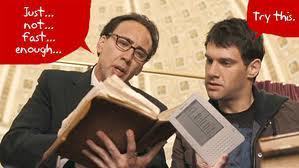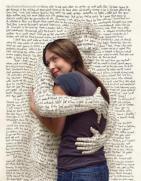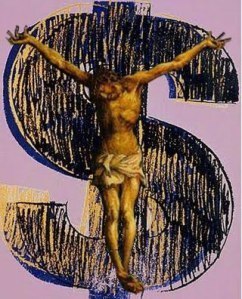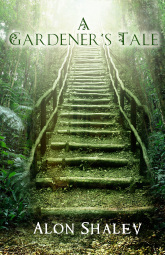Alon Shalev's Blog, page 51
December 26, 2011
Welcome to the World of E-books
Did you wake up this morning the proud, or maybe confused/intimidated owner of something small, electrical, and vaguely rectangular? Did you smile meekly last night while your loved ones looked on with bated breath as you apprehensively ripped open the packaging and did they cheer and clap their hands welcoming you into the technological age?
 And did they notice when you reached for that glass of brandy and took a gulp instead of a sip? Thousands of years in the future, archeologists will discover that man had a propensity to collect random items and leave them in their boxes. Often, they will claim to skeptical crowds, these gifts ran off of some obtuse energy source which was, no doubt very rare, since these gadgets seem to be hardly used.
And did they notice when you reached for that glass of brandy and took a gulp instead of a sip? Thousands of years in the future, archeologists will discover that man had a propensity to collect random items and leave them in their boxes. Often, they will claim to skeptical crowds, these gifts ran off of some obtuse energy source which was, no doubt very rare, since these gadgets seem to be hardly used.
Furthermore, they will note, primitive humans had a propensity to acquire the same gadget with slightly better features despite hardly using the gadget's predecessor.
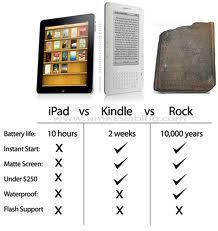 Have another sip of brandy. Oh, I forgot it is the morning after. Well you can always lace your cereal if you do it discreetly.
Have another sip of brandy. Oh, I forgot it is the morning after. Well you can always lace your cereal if you do it discreetly.
We are all entering the technological age, whether through brave adventurism, or without choice. You might as well take a deep breath and plunge in. Who knows, you might actually enjoy it.
Such things as cell phones and iPods seem to be accepted by all but a brazen few, even if the desire for the latest phone has nothing to do with actually making a call. The battle, for now, is over the tablet e-book reader. The world (at least those of us who don't need to worry about the little things like a roof over our heads, food at our next meal, or what's in the water supply) is divided into three groups.
1. Embracing the technology. These people don't just read on their iPad, Kindle or Nook, they embrace it, often with an annoying missionary zest. They don't take it out of their bag at the coffee shop or on the bus, they brandish it, like a mighty sword from days long past.
They are liable to chastise you, often in a smug, sympathetic way, as you balance your hardcover on your lap. "Oh," they whine in true Bob Dylan style, "How many trees does a Luddite reader fell…" When dealing with these people, it can be advantageous to note that the hefty hardcover has a distinct advantage over the light, sleek screen – it is far more effective when you take a swing at aforementioned annoying individual.
2. Luddite Conviction. No way! We are already spending too much time on screens. A book is more than just words on paper. You can smell it, feel the page crackle as you move through the novel, feel the weight of the author's perseverance as you hold his/her masterpiece in your hand… And then the classic, yet oft-doomed line: It will never catch on.
3. Dithering in the Middle. There is some middle ground. I have to admit that I love my Kindle. It is light, convenient, and I get a kick about the environmental aspects. I am also a confirmed Star Trek fan. However, I do also miss the feel and smell of the book. I love the art of a well thought out book cover, and I also love reading while soaking in a hot bath. My bookshelves are an important part of my identity in the house I share with my family.
So, some Advice for The Morning After:
Firstly: Don't Panic! Take a deep breath and slowly unwrap the gadget and take it out of its box.
Then: Go on your computer and find either the website for the company or go to You Tube. There are some really good, simple, step-by-step videos for people like us. Remember how hard it was to drive a car when we were learning?
Finally: Have another brandy. It is the holiday season after all. And take note: if you are reading this blog, then you have already embraced the blogosphere: the cutting edge of the Internet. You are already firmly in the 21st century, dude. YOU CAN DO THIS!
Oh, and if you did receive a Kindle, iPad, or whatever, this might be a good first book to read on your gadget (couldn't resist!).
——————————————————————————————————
Alon Shalev is the author of The Accidental Activist and A Gardener's Tale. He is the Executive Director of the San Francisco Hillel Foundation, a non-profit that provides spiritual and social justice opportunities to Jewish students in the Bay Area. More on Alon Shalev at http://www.alonshalev.com/ and on Twitter (#alonshalevsf).
December 23, 2011
Last Minute Gift?
It's quick. You don't need to battle frantic store crowds. It's environmental. It's not expensive…
Did you know you can buy an e-book and send it directly to a friend as a gift?
Any Kindle book available for purchase in the Kindle Store can be given as a gift to anyone with an e-mail address. You do not need a Kindle device to send or receive Kindle book gifts, and the recipient can read their gift on a registered Kindle device or any free Kindle reading application.
All you need to know is that person's email. You can add a personal message as well. For more details, click here. Apart from giving a meaningful gift, you are also helping a struggling author. Here are 10 other ways to help a friend who is an author.
Happy Holidays.
——————————————————————————————————
Alon Shalev is the author of The Accidental Activist and A Gardener's Tale. He is the Executive Director of the San Francisco Hillel Foundation, a non-profit that provides spiritual and social justice opportunities to Jewish students in the Bay Area. More on Alon Shalev at http://www.alonshalev.com/ and on Twitter (#alonshalevsf).








December 22, 2011
Redefining the U.S. Government – Roger Ingalls

Picture from theviewspaper.net
How would an honest educator define the current U.S. form of government to a body of students? This is the question I've asked myself while trying to fall asleep, night after night. The key word in the above question is "honest".
The U.S. is no longer a true democracy or republic. Our government has latently morphed over the past 30 years into a dual-form system. It's similar to the Constitutional Monarchy found in the United Kingdom except the power and ceremonial aspects are reversed.
In a modern Constitutional Monarchy, the democratically elected politicians are the true governing body (Parliament, Congress, President, Prime Minister…) and the Monarchy or Royal Family act as ceremonial figures.
In the current U.S. form of government, elected officials are a ceremonial by-product of a ritual balloting process that provides no positive impact on the voting public. Casting a vote is now just a feel-good public ceremony that pays homage to the concept of democracy.
Unlike the United Kingdom, a group-Monarchy or, more accurately, Plutarchy is the real governing power in the United States. Elected politicians are controlled by the wealthy for the wealthy. They're influenced and financed through campaign contributions by famous and influential individuals, CEOs, corporations, financial institutions and Wall Street players. Essentially, politicians are personal policy generators for the wealthy few.
Accurately defining our current form of government: Pseudo-Democratic Plutarchy is a form of government in which power effectively rests with the wealthy via financial control over political candidates and propaganda means (Main Stream Media). The wealthy finance their desired group of candidates which effectively pre-selects favorable agents. The final selection is left to the voting public in a ceremonial pageant resembling a democratic election.
Pseudo-Democratic Plutarchy: A product of conservative deregulation.
—————————————————–
Roger Ingalls is well traveled and has seen the good and bad of many foreign governments. He hopes his blogging will encourage readers to think more deeply about the American political system and its impact on US citizens and the international community.

December 21, 2011
The Menorah and The Xmas Tree – The Perfect Opportunity
Last night was the first night of Chanukah, a Jewish festival celebrating freedom. Since the Jewish calender is lunar, this year Christmas and Chanukah fall at the same time. Even when they are not close together, these two highly visual festivals throw up many challenges for children of Jewish parents – decorations, gifts, commercialism, I'm different from my friends etc.
But with half American Jewry in mixed marriages (only one of the couple is Jewish) this offers different challenges. I meet a lot of students from mixed marriages as well as members of my synagogue community, and I hear the stories. Such couples really have three options:
1) to follow one religion.
2) to follow no religion.
3) to celebrate both religions.
It is not for me or you to pass judgement on any of the three options. Each couple or family have their own unique factors to consider when deciding. I am not going to talk about how a Jewish couple deal with their child wanting a Christmas tree because his friend has one. This is all about Jewish identity and I feel that the stronger the family's Jewish identity, the less threatening such discussions are.
I want to strengthen the families who offer both religions. The child will decide when they grow older which spiritual path they choose to walk. These couples offer knowledge and experience in both religions and often have a richer spiritual household for doing so. As this winter semester ended and Christmas decorations were springing up all over San Francisco, I participated in a number of discussions with students at San Francisco Hillel (the Jewish student center) and heard some wonderful and some painful stories.
I wish every couple who must deal with the dilemma of the menorah and Christmas tree will be empowered to enjoy the freedom of however they choose to express their spirituality. I hope those of us who light the menorah will invite our non-Jewish friends to join us. In a couple of days, I will drive my family to join dear Christian friends who have invited us to share their joy. We go as proud Jews: proud of our heritage and proud of our friendships.
Most of all, I am feel blessed to live in the Bay Area and proud to live in a society that can celebrate diversity. The Irish comedian, Dave Allen, who sadly passed away a few years ago, would conclude his TV show for years with the word: "Good night and may your God go with you."

————————————————————————————————————————————————————————–
Alon Shalev is the author of The Accidental Activist and A Gardener's Tale. He is the Executive Director of the San Francisco Hillel Foundation, a non-profit that provides spiritual and social justice opportunities to Jewish students in the Bay Area. More on Alon Shalev at http://www.alonshalev.com/ and on Twitter (@alonshalevsf).

December 20, 2011
Do we know it's Christmas… Over here? Tom Rossi
As we prepare to celebrate the birth of Christ (ostensibly) in this Christian-dominated (politically, anyway) country, it might be a good time to take a brief look at what we claim to believe in.
We believe in the Bible, and we believe in personal wealth. We profess our love for Jesus, and we vote Republican or Republican-light (Democrat). We recite the ten commandments, and our national pastime is coveting.
In his thought-provoking book, "Celebration of Discipline: the Path to Spiritual Growth," Richard Foster wrote that there is, "… a prevailing notion that the Bible is ambiguous about economic issues." He goes on to say, "No serious reading of scripture can substantiate such a view. The biblical injunctions against the exploitation of the poor and the accumulation of wealth are clear and straightforward." Foster proceeds to pose several examples with scriptures referenced.
So how is it that the party of riches is also the party (supposedly) of Christianity? How is it that people think they're voting for God when they vote republican? Aren't they actually voting against God, Jesus, and what it actually says in the Bible?
I have to be honest. Even though I have studied many things and was raised in the Catholic church, I'm quite an agnostic. My dad named me after Saint Thomas Aquinas but I take after "doubting" Thomas much more. I question everything. My religion is reason and what offends me is intellectual dishonesty or hypocrisy.
But after studying the words of Christ a little bit as an adult, I realize that I'm the one who actually believes in what he taught, while it seems that 90% of the people who call themselves "Christians" really worship some manufactured image that better suits their ideologies and goals.
People hide behind religion to justify voting for selfishness, for maintaining the imbalances inherit in the present system. They vote to keep the "privileged few" privileged, because they are either now members of that club or psychotically hold onto the belief that they will be, one day.
When Jesus said, "No one can serve two masters" (Matthew 6:24), he was talking about money and God. It's pretty clear that he meant that the pursuit of money would certainly take one's mind and efforts from God and the way of life that Jesus advocated. How did it come to be that so many of the very representatives of Christianity are multi-millionaires? And I won't even get started on the "Christian" politicians.
Much is written, every year now, about how Christmas has become so commercial. That's not it. We worship money every day of the year and that worship is enshrined as our one true national religion. We duly elect the perfect representatives… those who epitomize "money-ism" of one form or another. Christmas is just the culminating orgy of what goes on all year long.
What would I change? Plenty. But let's start with the elimination of hypocrisy. This Christmas (or Chanukah or Kwanzaa or whatever else you might celebrate), look at yourself honestly in the mirror and admit what's important to you. Maybe it's money. OK, nothing wrong with that. Just admit it. When I look in the mirror I see Lorne Greene, a martian, and sometimes Martha Stewart. I've really gotta stop drinking so much.
What I want for Christmas this year is for everyone to open their eyes and see that their leaders are mostly just trying to get even richer. Then to realize that claims those leaders make about how to be a better Christian are mostly lies. People vote based on these lies. That makes them dangerous.
But forget about politics for now. Spend your vacation with family, friends, or your favorite snow-capped mountain or evergreen forest. Let yourself step off of the rat-racetrack for a few days, and have a happy holiday season. We'll talk politics when you get back.
-Tom Rossi
___________________________________________________________________________
Tom Rossi is a commentator on politics and social issues. He is a Ph.D. student in International Sustainable Development, concentrating in natural resource and economic policy. Tom greatly enjoys a hearty debate, especially over a hearty pint of Guinness.
Tom also posts on thrustblog.blogspot.com
___________________________________________________________________________

December 19, 2011
Author Salon – Creating Community
I have written several times on Left Coast Voices about initiatives that create online communities in a win: win framework. I think that Meetup is a good example of this. I have also written about how the idea of an author's life being a solitary one is outdated and ridiculous. If a writer chooses to walk alone this is his/her choice. There are many options today that Mark Twain never had.
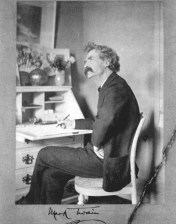
A Master At His Desk
So I was excited when a colleague introduced me to Author Salon, a new initiative aimed at helping authors prepare to pitch and market their manuscripts. It is a win:win community wherein the author is able to hone their work, while agents and publishers can delve in knowing these writers have done their due diligence.
When you sign up for Author Salon there are a lot of questions about your work. Often these questions make you look at your manuscript through new eyes. This is essentially the idea, that you see it not as the writer, but as the agent or publisher.
You will need to refine your pitch, synopsis, introduce your characters, clarify the overriding conflict and examine many other aspects. You need to plan for a few hours at least and this is only the first round.
Once you have completed your proposal, it is reviewed by peers and the Author Salon staff, all experienced agents or people who have worked in the publishing business for years. You get graded as your proposal is developed and this enables the agents and publishers who troll the site to know who is holding a more finished product.
This is not a get-rich-quick or silver bullet offer. Author Salon seems to hold pretty high standards and if you have a tender ego, perhaps you had better give this one a miss.
However, if your goal is to get published, if you fear your manuscript sinking into the publishers' ever-growing slush pile and if you are willing to do what it takes, Author Salon might just be the answer.

Slush Pile
For those interested in learning more, here is the Author Salon mission:
First, to make Author Salon a preferred source of discovery for literary agents, producers, and publishing house editors. Author Salon opens channels to professionals to keep them updated on desirable projects, and for those who wish to search, we provide detailed writer and project profiles, multiple search parameters, and lists of high-rated projects, thus enabling professionals to more quickly obtain a range of information, and in a manner conducive to productive decision-making.
Second, to create a 24/7 writers conference environ utilizing a criteria-based step by step workshop approach that includes a primary and upper level peer-and-pro review process, a separate two level review by Author Salon, additional forum-based draft workshops, as well as a final top level review on the part of seasoned peers and players in the publishing business. We tell the writer what works, what doesn't work, and what needs to be developed further – while they can still do something about it – and before an agent or publisher shuts the door in their face.
Third, to sustain a suitable and pragmatic work space for the nonfiction and novel writing community that combines the technical advantages of a Facebook-like environ (instant chat, site mail, video embeds, etc.) with the content approach of Publisher's Marketplace. In other words, Author Salon provides the communication and features technology the writer community needs while enabling easy access to a backdrop of publishing news, as well as writer resource and craft content.
Fourth, to make Author Salon a trusted source of tie-breaking, valuable information on fiction and nonfiction writing, craft, publishing, and book marketing that avoids the myths and sticks only to the facts.
——————————————————————————————————
Alon Shalev is the author of The Accidental Activist and A Gardener's Tale. He is the Executive Director of the San Francisco Hillel Foundation, a non-profit that provides spiritual and social justice opportunities to Jewish students in the Bay Area. More on Alon Shalev at http://www.alonshalev.com/ and on Twitter (#alonshalevsf).
December 16, 2011
What Inspired The Accidental Activist?
I was asked this question at the Book Review site: Rainy Days & Mondays and want to share my response with you.
Every novel I write begins with a personal catalyst. The Accidental Activist was inspired by a chance meeting with an old friend from my childhood in England, who I met in the desert in the Middle East, and that I wrote about here in the US.
I was a tour guide and the group leader turned out to have attended a youth center I had worked at in London, ten years before. He remembered how passionate I was about grassroots activism.
"I've been working on something you have to see," he said, whipping out his laptop and bringing up a website.
I was enthralled, since in the early '90′s, both a laptop and a website were cutting edge! But this guy had something more important to show me. He explained how a multinational corporation (McDonald's) was suing two friends of his for distributing leaflets highlighting many of McDonald's' practices. There was no legal aid for libel (this has changed now because of this case) and so they were defending themselves.
This guy and some friends had built a website to help garner support and information. I was fascinated. At that time, I used the Internet to write emails and get soccer results (I am British). I didn't know then of the potential the Internet had. Few people did, McSpotlight.org was, I believe, the first interactive advocacy website.

The McSpotlight Website
As word spread, the website began to receive evidence from as far as experts working in the rainforests in South America and trade unionists in Australia.
I was fascinated by the impact of the Internet as a tool for social change. As the case unfolded, a number of amazing incidents that highlight the behavior of multinational corporations kept my attention. I won't mention them here because they are in my book.
I became intrigued by the transformation of a number of individuals impacted by the case. I decided to write a fictional account, not for the sensationalism because almost everything in the book is based upon something that really happened, but because I wanted to highlight the role of the website and the role of an empowered individual.
Most of us can identify with my protagonist, Matt. He is the guy you work with, have a drink with and watch the football games with. But he is also a guy who is personally affronted by the bullying tactics of big business when it challenges a close friend, and he is galvanized into action when he discovers he has the skills to fight back.
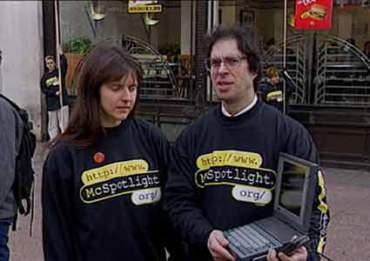
Steel and Morris showing the website
I loved writing The Accidental Activist because I was excited by the court case, the potential of the Internet and eventually the trials and tribulations of my characters, who became good friends.
But I have also become enthralled by the idea of Transformational Fiction, where ordinary people are drawn into fighting a social injustice and in doing so experience a life-shifting internal change.
I want my writing to inspire people to stand up for what they believe in. I want it to be an empowering experience. One of my favorite quotes is from Richard Wright: "I would hurl words into the darkness and wait for an echo. If an echo sounded, no matter how faintly, I would send other words to tell, to march, to fight."
Using the form of novels enable me to try and inspire, not though political speeches, but identifying with characters who are similar to you and me.
I have written three other manuscripts and, in each, the protagonist goes through a transformative process. In A Gardener's Tale, the protagonist helps a young outcast become a meaningful and respected member of the community. In The Accidental Activist, as mentioned, a self absorbed computer programmer takes up the struggle against a multinational corporation who is trying to silence protestors in order to get laid (well kind of), but discovers he can harness his talents to help improve the world.
Unwanted Heroes will be released in the spring of 2012 and tells the story of a young man who befriends a mentally disturbed war veteran and uses his talents to help the old man come to terms with his past and rebuild his life.
I never consciously wrote these novels with this common theme until The Accidental Activist was being critiqued. But now I feel very comfortable and inspired to follow this path. And if it can inspire a few readers along the way, I will feel I am doing my part in creating a better world.
——————————————————————————————————
Alon Shalev is the author of The Accidental Activist and A Gardener's Tale. He is the Executive Director of the San Francisco Hillel Foundation, a non-profit that provides spiritual and social justice opportunities to Jewish students in the Bay Area. More on Alon Shalev at http://www.alonshalev.com/ and on Twitter (#alonshalevsf).

December 15, 2011
What Ever Happened to the Golden Rule? – Roger Ingalls
Nothing infuriates me more than religious intolerance. It's hypocrisy at its worst.
American religious fanaticism is becoming pandemic and worrisome because most groups and pursuing an agenda of intolerance. This is a path to trouble. Someone once told me that the two most fanatically religious places in the world were the Middle East (Islam) and the United States (Christianity) and being young and naïve at the time, I said, "that's crazy". Now I know better – that old man was right.
Most faiths have an "Ethic of Reciprocity" or what's commonly known as "The Golden Rule".
Christianity: "Therefore all things whatsoever ye would that men should do to you, do ye even so to them: for this is the law and the prophets." Matthew 7:12, King James Version.
Islam: "None of you [truly] believes until he wishes for his brother what he wishes for himself." Number 13 of Imam "Al-Nawawi's Forty Hadiths."
Judaism: "…thou shalt love thy neighbor as thyself.", Leviticus19:18
Brahmanism: "This is the sum of Dharma [duty]: Do naught unto others which would cause you pain if done to you". Mahabharata, 5:1517 "
Buddhism: "…a state that is not pleasing or delightful to me, how could I inflict that upon another?" Samyutta NIkaya v. 353
Confucianism: "Try your best to treat others as you would wish to be treated yourself, and you will find that this is the shortest way to benevolence." Mencius VII.A.4
Shinto: "The heart of the person before you is a mirror. See there your own form."
Roman Pagan Religion: "The law imprinted on the hearts of all men is to love the members of society as themselves."
Native American Spirituality: "All things are our relatives; what we do to everything, we do to ourselves. All is really One." Black Elk
Ancient Egyptian: "Do for one who may do for you, that you may cause him thus to do." The Tale of the Eloquent Peasant, 109 – 110 Translated by R.B. Parkinson. The original dates to 1970 to 1640 BCE and may be the earliest written Golden Rule.
Zoroastrianism (The oldest one-God religion and the foundation for Judaism, Christianity and Islam): "That nature alone is good which refrains from doing unto another whatsoever is not good for itself". Dadistan-i-dinik 94:5 and "Whatever is disagreeable to yourself do not do unto others." Shayast-na-Shayast 13:29
These religions, and many others, promote the basic idea of reciprocal fair treatment. If this is so, why are we so intolerant of other's beliefs?
Perhaps we need to do a little self-examination. Do we truly practice the teachings of our religions or are we just hypocrites?
Special thanks to thesynthesizer.com for the various golden rules.
————————————————————————-
Roger Ingalls is well traveled and has seen the good and bad of many foreign governments. He hopes his blogging will encourage readers to think more deeply about the American political system and its impact on US citizens and the international community.

December 14, 2011
Trying to Move the Climate Stalemate
Neil Goldberg's excellent post on Monday frustrated me.Millions of people displaced by rising water isn't a major world issue? I started to do my own search and while more is appearing on the Internet, it seemed either too scientific (for me at least), too confusing or politically vague. One site that did stand out is Planet Change.
I did find this interview helpful and have included it here. Listen to the Good Cop, Bad Cop question (or rather the answer).

Despite Miles Austin's optimism (not the Dallas Cowboys player), I can't help wondering why there is no sense of urgency. Does it dull people's senses to discuss 2020 or 2050? The reality is that the problem is so huge in magnitude that we have very little time and just reaching a global consensus seems too difficult to reach.
Have I missed anything? Anyone out there in the blogosphere have a ray of optimism to glean from the crumbs thrown down by the UN Climate Conference?
——————————————————————————————————
Alon Shalev is the author of The Accidental Activist and A Gardener's Tale. He is the Executive Director of the San Francisco Hillel Foundation, a non-profit that provides spiritual and social justice opportunities to Jewish students in the Bay Area. More on Alon Shalev at http://www.alonshalev.com/ and on Twitter (#alonshalevsf).








December 13, 2011
Why Aren't You in Better Shape? – Tom Rossi
I used to be in great physical condition. In fact, it wasn't all that long ago – just a few years. I used to work out with weights, play hockey, run, hike, play tennis, all sorts of things. At the time, I used to look at overweight people and think, "Gland problem? Genetics? My ass. Laziness and a lack of self-control with food – that's your problem."

Before
But at times in my life, including recently, I've had things go wrong… things that have interfered with my conditioning. I've had a lot of semi-serious injuries. Most recently, I injured my Achilles tendon and despite doctors' visits, physical therapy, and endless stretching and coddling, it just won't stop hurting. I've also injured several other joints over the years – shoulders, knees, etc.
Work is another insult to physical training. In a couple of jobs I've had, I worked about 55 hours per week, sometimes more. Coming home from this, exhausted, I certainly didn't feel like going running or anything, even though that's probably exactly what I needed. Instead, I collapsed on the couch with a bag of chips while "dinner" was warming up in the microwave.
While working at stressful jobs, I also ate a lot of "convenience" food… in other words, crap you wouldn't feed your dog. Fatty, sugary junk – that's what I had time for. My mid-section started to grow.

After
I'm not lazy – at least not physically. So why was I getting fat? Why am I about 25 pounds overweight now? Circumstances. Maybe my own stupidity contributed to these circumstances at times, but some could not have been changed.
This got me to thinking about the way that people with jobs, people with their finances more or less under control, look at the unemployed and the ones of us that are having serious money troubles. It's so easy to think, "I guess I'm just smarter than those people. I've made better decisions and I adapt to changing circumstances."

Before
I don't really believe in luck. I often say, "It's bad luck to be superstitious." But look at the example of a good friend of mine. Let's call him "Jim" to avoid bringing any unwanted attention to him. Jim joined another friend's successful flooring business (tile, wood, carpet, etc.) and built a franchise in a new location. This was during the housing frenzy somewhere around 2004, if I remember correctly.
Jim is an incredibly hard worker and a very energetic person. He leased a small warehouse, bought a forklift and a good-sized van and hired a few workers. He got up at 4:30 in the morning and was in the office before 5:30 every day, where he stayed until late in the evening if he wasn't out supervising, estimating, etc. He researched his business every day and did his best (he's also a very smart guy, with an MBA) to make good decisions in running his business.
To make a long story short, when the housing market crashed, so did his business. Now, he's deep in debt and selling everything at a huge loss. Could you look Jim in the eye and say, "You were stupid and/or lazy, and that's why you failed?"
Circumstances. They can strike anyone, anywhere, at any time. So when you see someone in trouble, maybe you can't afford to give them the money to get back on their feet, but don't judge. You don't know what went into their situation. Maybe their business partner embezzled all of their money. Maybe he or she has a kid with an expensive disease. Maybe a family member was in a terrible accident and medical care and physical therapy went well beyond any medical coverage that had been in place.

After
There are "losers" in this world. But don't assume that those who have lost "deserved" to have lost. I'm now one of those overweight people, and I'll never again think it's easy to stay thin.
-Tom Rossi
___________________________________________________________________________
Tom Rossi is a commentator on politics and social issues. He is a Ph.D. student in International Sustainable Development, concentrating in natural resource and economic policy. Tom greatly enjoys a hearty debate, especially over a hearty pint of Guinness.
Tom also posts on thrustblog.blogspot.com
___________________________________________________________________________









